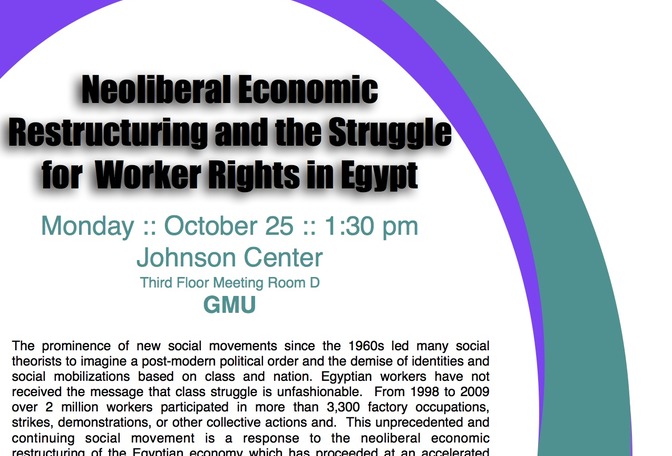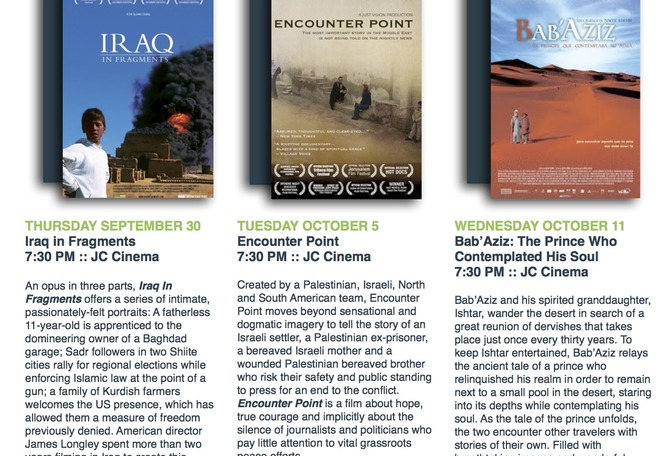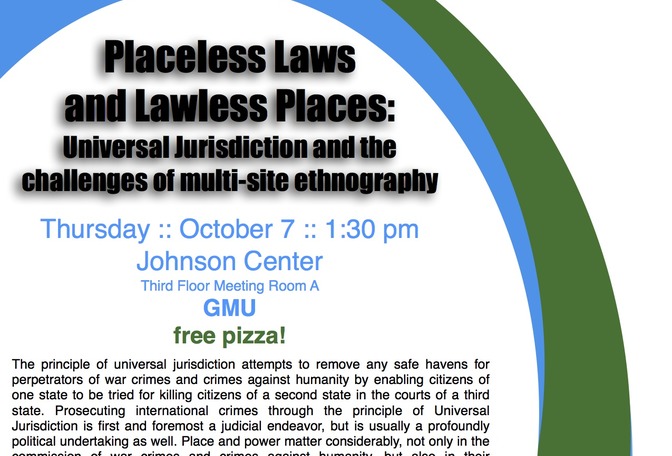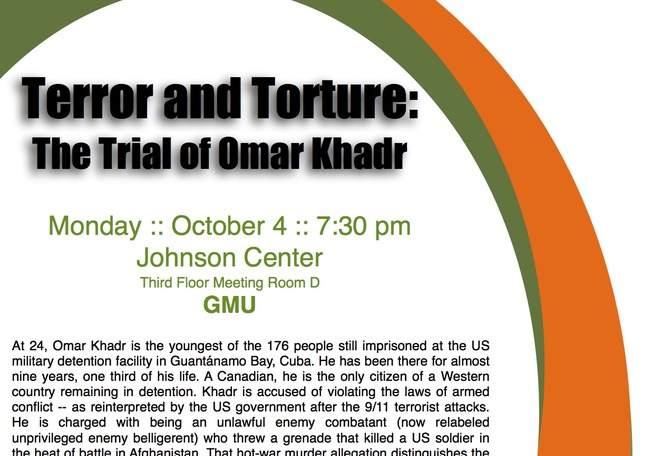- FAMA
- Researchers
-
Projects
- MESPI
- Knowledge Production Project >
-
Political Economy Project
>
- Development and the Uprisings
- Class Formations and Dynamics
- The Palestinian Economy: Fragmentation and Colonization
- Tunisia: A Political Economy in Transition
- Migrant States, Mobile Economies: Rethinking the Political in Contemporary Turkey
- Political Economy of the Middle East: Continuities & Discontinuities in Teaching & Research
- 2016 Political Economy Institute
- The Lebanon Project >
- The Palestine Project >
- The Civil Society Project >
- Middle East Media Project >
- The Egypt Project >
- Refugees and Migrants Project >
- Black-Palestinian Transnational Solidarities Project
- Initiatives
- Events
- Summer Institutes
- Internships
- Blog
|
October 25, 2010 @ 1:30pm
Johnson Center, Room D George Mason University Fairfax, Virginia Sponsored by the Middle East Studies Program, the Ali Vural Ak Center for Global Islamic Studies, and the MEtc Film Club. Featuring... Joel Beinin The prominence of new social movements since the 1960s led many social theorists to imagine a post-modern political order and the demise of identities and social mobilizations based on class and nation. Egyptian workers have not received the message that class struggle is unfashionable. From 1998 to 2009 over 2 million workers participated in more than 3,300 factory occupations, strikes, demonstrations, or other collective actions and. This unprecedented and continuing social movement is a response to the neoliberal economic restructuring of the Egyptian economy which has proceeded at an accelerated pace since the July 2004 installation of the government of Prime Minister Ahmad Nazif. Joel Beinin is the Donald J. McLachlan Professor of History and Professor of Middle East History at Stanford University. From 2006 to 2008 he served as Director of Middle East Studies and Professor of History at the American University in Cairo. In 2001-02 he served as president of the Middle East Studies Association of North America. He is the author of The Struggle for Worker Rights in Egypt (Solidarity Center, 2010); and Workers and Peasants in the Modern Middle East (Cambridge University Press, 2001). He received his Ph.D. from the University of Michigan in 1982, his M.A. from Harvard University in 1974, and his B.A. from Princeton University in 1970.
0 Comments
October 11, 2010 @ 7:30pm
JC Cinema George Mason University Fairfax, Virginia Sponsored by the Arab Studies Institute, MEtc and MESP Fall 2010 Film Series Bab’Aziz and his spirited granddaughter, Ishtar, wander the desert in search of a great reunion of dervishes that takes place just once every thirty years. To keep Ishtar entertained, Bab’Aziz relays the ancient tale of a prince who relinquished his realm in order to remain next to a small pool in the desert, staring into its depths while contemplating his soul. As the tale of the prince unfolds, the two encounter other travelers with stories of their own. Filled with breathtaking images and wonderful music, Nacir Khemir has created a fairytale-like story of longing and belonging, filmed in the enchanting sandscapes of Tunisia and Iran. October 7, 2010 @ 1:30pm
Johnson Center, Room A George Mason University Fairfax, Virginia Sponsored by the Middle East Studies Program, the MEtc Flim Club, and the Ali Vural Ak Center for Global Islamic Studies. Pizza served. Featuring... Dr. Laurie King The principle of universal jurisdiction attempts to remove any safe havens for perpetrators of war crimes and crimes against humanity by enabling citizens of one state to be tried for killing citizens of a second state in the courts of a third state. Prosecuting international crimes through the principle of Universal Jurisdiction is first and foremost a judicial endeavor, but is usually a profoundly political undertaking as well. Place and power matter considerably, not only in the commission of war crimes and crimes against humanity, but also in their prosecution. Ethnographers of emerging global legal institutions and practices face special challenges in finding a place, literally and figuratively, from which to analyze and interpret the processes and outcomes of events that have many contexts and comprise conflicting interests and pronounced power differentials. Laurie King is a social anthropologist, writer, and editor. She conducted her field research in Nazareth, the largest all-Arab city in Israel on a Fulbright doctoral dissertation scholarship in 1992-93. She has worked in journalism in Washington, DC (Middle East Report) and in Beirut on human rights issues. Currently she is teaching at Georgetown University and completing a manuscript for Routledge entitledUniversal Jurisdiction for Humanitarian Crimes: the Belgian Experiment. October 4, 2010 @ 7:30pm
Johnson Center, Room D George Mason University Fairfax, Virginia Sponsored by the Middle East Studies Program, the MEtc Film Club, and the Ali Vural Ak Center for Global Islamic Studies. Featuring... Lisa Hajjar At 24, Omar Khadr is the youngest of the 176 people still imprisoned at the US military detention facility in Guantánamo Bay, Cuba. He has been there for almost nine years, one third of his life. A Canadian, he is the only citizen of a Western country remaining in detention. Khadr is accused of violating the laws of armed conflict -- as reinterpreted by the US government after the 9/11 terrorist attacks. He is charged with being an unlawful enemy combatant (now relabeled unprivileged enemy belligerent) who threw a grenade that killed a US soldier in the heat of battle in Afghanistan. That hot-war murder allegation distinguishes the case against Khadr from those charged with terrorist acts outside a theater of war, including al-Qaedaʼs 1998 US embassy bombings in Kenya and Tanzania, the 2000 attack on the USS Cole and the September 11 attacks, which precipitated the launch of the global war on terror. Lisa Hajjar is an associate professor in the Sociology Department at the University of California - Santa Barbara. She is the author of Courting Conflict: The Israeli Military Court System in the West Bank and Gaza (University of California Press, 2005), and is currently working on a book about torture-related litigation in the US. |
Forum on Muslim and Arab AffairsFAMA is the research arm of the Arab Studies Institute. Archives
June 2017
Categories |
- FAMA
- Researchers
-
Projects
- MESPI
- Knowledge Production Project >
-
Political Economy Project
>
- Development and the Uprisings
- Class Formations and Dynamics
- The Palestinian Economy: Fragmentation and Colonization
- Tunisia: A Political Economy in Transition
- Migrant States, Mobile Economies: Rethinking the Political in Contemporary Turkey
- Political Economy of the Middle East: Continuities & Discontinuities in Teaching & Research
- 2016 Political Economy Institute
- The Lebanon Project >
- The Palestine Project >
- The Civil Society Project >
- Middle East Media Project >
- The Egypt Project >
- Refugees and Migrants Project >
- Black-Palestinian Transnational Solidarities Project
- Initiatives
- Events
- Summer Institutes
- Internships
- Blog





 RSS Feed
RSS Feed
